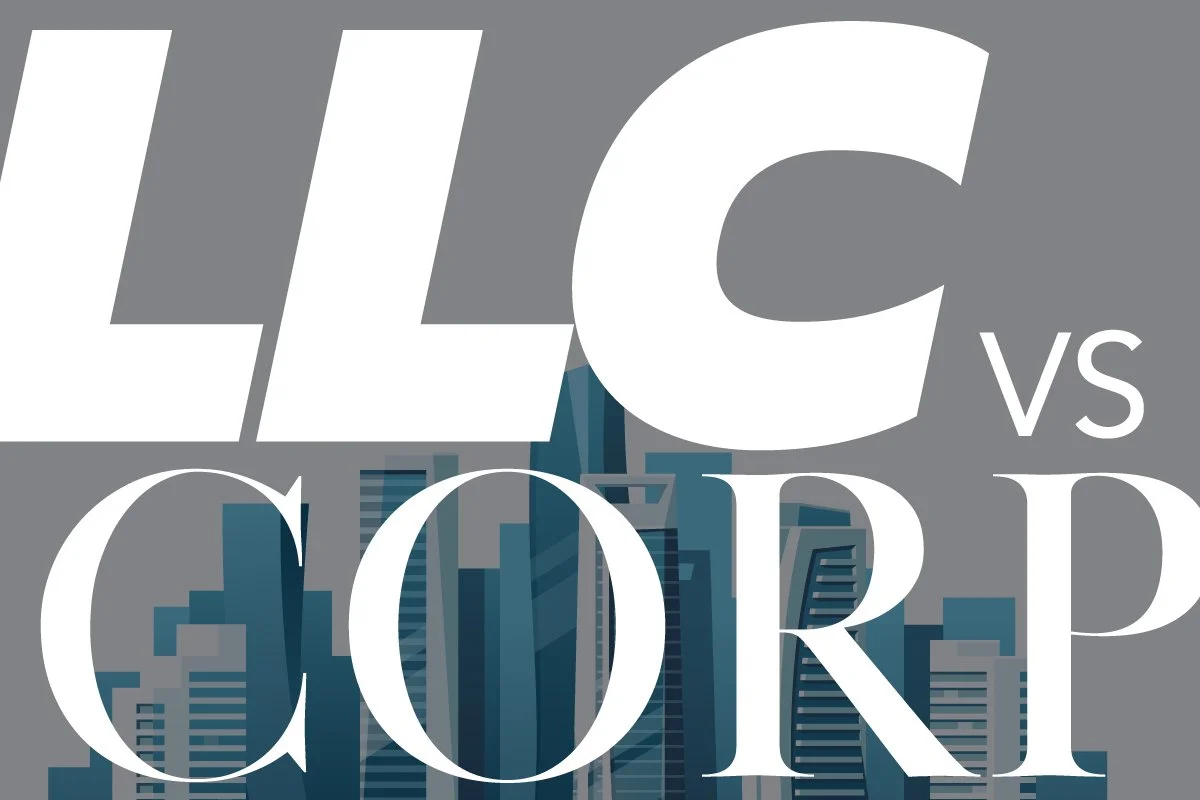Business Structure and its impact on financial planning: LLC vs. Corp
Choosing the right business structure is one of the most important financial decisions an entrepreneur will ever make. It determines how your business is taxed, how profits are distributed, how much personal risk you carry, and even how you can raise money in the future.
Two of the most common structures for small and medium-sized businesses are the Limited Liability Company (LLC) and the Corporation (C-Corp or S-Corp). While both offer limited liability and legal protection, their impact on financial planning can be dramatically different.
Let’s break down how each structure affects your business finances and what to consider when choosing between them.
Taxation and Profit Distribution
LLC:
An LLC is often praised for its tax flexibility. By default, profits and losses “pass through” to the owners (called members) and are reported on their personal tax returns—avoiding double taxation.
This means you only pay taxes once, at the individual level. However, LLC members must pay self-employment taxes (Social Security and Medicare) on the full amount of profits, whether or not the money is distributed.
An LLC can also elect to be taxed as an S-Corporation, which may reduce self-employment tax by allowing owners to take part of their income as a salary and part as a distribution.
Corporation:
A C-Corporation is taxed separately from its owners. Profits are subject to corporate income tax, and dividends distributed to shareholders are taxed again on personal returns—commonly known as double taxation.
However, corporations can often deduct more expenses, such as health insurance, fringe benefits, and retirement contributions. The flat federal corporate tax rate (currently 21%, according to the IRS) can also be advantageous for businesses that plan to reinvest profits rather than distribute them.
An S-Corporation, by contrast, offers pass-through taxation like an LLC but has stricter ownership rules—limited to 100 shareholders who must be U.S. citizens or residents.
Financial Planning and Flexibility
LLC:
LLCs offer simplicity in management and operations. They’re ideal for business owners who want flexibility in how they allocate profits and handle expenses. Members can reinvest profits easily or adjust payouts as needed without the formalities required by a corporation.
For financial planning, this flexibility allows for easier cash flow management and simplified accounting. However, it may be harder for LLCs to raise capital since they can’t issue stock.
Corporation:
Corporations—especially C-Corps—offer greater potential for scaling. They can issue stock, attract investors, and offer equity-based compensation, which makes them appealing for businesses planning to expand or seek venture capital.
However, corporations come with stricter compliance requirements, such as annual shareholder meetings, formal recordkeeping, and more complex accounting. This makes financial planning more structured but also more administrative.
Liability and Legal Protection
Both LLCs and corporations protect personal assets from business liabilities, but the key difference lies in how well that protection is maintained.
For LLCs, it’s crucial to maintain clear separation between business and personal finances—mixing funds (known as commingling) can weaken liability protection.
Corporations, due to their rigid structure and documentation requirements, often provide stronger protection in lawsuits or audits—assuming compliance is consistently maintained.
Long-Term Planning and Exit Strategy
Your business structure affects not only how you operate but also how you exit.
LLC: Easier to dissolve or transfer ownership in small partnerships. However, it may be harder to sell or attract large-scale investors.
Corporation: More appealing for acquisition, merger, or public offering because of its stock structure. Corporate shares are easier to value and transfer.
If you plan to sell or scale your business, a corporation may align better with long-term financial goals.
Administrative Complexity
LLCs typically have fewer reporting and filing requirements, making them easier to manage day to day. Corporations, meanwhile, require more formal structure—bylaws, shareholder meetings, and annual reports.
While these requirements can seem burdensome, they provide transparency and accountability—valuable traits for investors, lenders, and potential buyers.
Which Is Right for You?
Choosing between an LLC and a corporation depends on your goals, size, and growth plans:
GoalBetter FitSimple structure, flexibility, and pass-through taxationLLCAttracting investors or planning to scale nationallyCorporationMinimizing self-employment tax via S-Corp electionEither (S-Corp status)Reinvesting profits for growthC-Corporation
Consulting with an accounting professional or business advisor is the best way to evaluate how each option aligns with your financial goals, risk tolerance, and tax strategy.
Summary
Your business structure sets the foundation for every financial decision you make—from managing taxes and payroll to raising capital and planning for the future.
An LLC offers flexibility and simplicity, while a corporation provides structure and scalability. The right choice depends on your growth ambitions, risk exposure, and how you want your finances to evolve over time.
At Efficient Enterprise Solutions, we help small and mid-sized business owners navigate these choices with confidence—ensuring your structure supports your success, not limits it.
Ready to assess your financial structure? Let’s connect and plan your next step.

